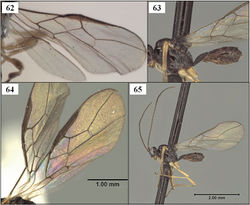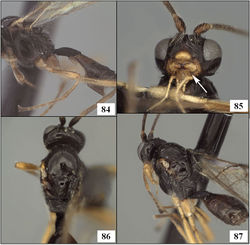Tubiformopius
| Notice: | This page is derived from the original publication listed below, whose author(s) should always be credited. Further contributors may edit and improve the content of this page and, consequently, need to be credited as well (see page history). Any assessment of factual correctness requires a careful review of the original article as well as of subsequent contributions.
If you are uncertain whether your planned contribution is correct or not, we suggest that you use the associated discussion page instead of editing the page directly. This page should be cited as follows (rationale):
Citation formats to copy and paste
BibTeX: @article{Wharton2012ZooKeys243, RIS/ Endnote: TY - JOUR Wikipedia/ Citizendium: <ref name="Wharton2012ZooKeys243">{{Citation See also the citation download page at the journal. |
Ordo: Hymenoptera
Familia: Braconidae
Name
Tubiformopius Fischer stat. rev. – Wikispecies link – Pensoft Profile
- Tubiformopius Fischer, 1998: 26. Type species: Opius tubigaster Fischer, 1968. Original designation.
Diagnosis
Mandible very weakly narrowing, nearly parallel-sided over distal 0.5, more abruptly widening basally, with weak to distinct basal lobe. Labrum narrowly exposed to concealed. Clypeus relatively weakly but distinctly protruding in profile; ventral margin truncate. Malar sulcus absent or represented only by a short, weak indentation adjacent eye; malar space distinct, at least as long as basal width of mandible. Occipital carina broadly absent dorsally, present laterally, distinctly separate from hypostomal carina ventrally. First flagellomere much longer than second. Propleuron ventral-laterally without oblique carina. Notauli short, shallow, narrow, confined to anterior declivity, not extending onto disc posteriorly; distinct midpit absent. Precoxal sulcus broad, very weakly impressed, unsculptured. Propodeum granular rugose, without areola. Fore wing stigma long, narrow, curled in holotypes of both species treated below, but not as discrete distally as in Lorenzopius and Stigmatopoea; r1 arising distinctly basad midpoint of stigma but not from extreme base; m-cu entering first submarginal cell, widely separated from second submarginal cell; second submarginal cell with 2RS much shorter than 3RSb; 2CUb arising near middle of hind margin of first subdiscal cell, the posterior-distal corner of the latter broadly open. Dorsope and laterope of T1 absent; S1 about 0.5–0.6 × length of T1, apparently fused to T1; T1 long and narrow throughout; T2 and following terga unsculptured. Ovipositor not tapering evenly to a fine point.
Remarks. The diagnosis above is based on the holotypes of Tubiformopius tubigaster (Fischer) and Tubiformopius tubibasis (Fischer), new combination.
Fischer’s (1998)[1] original description of Tubiformopius was very brief since it was only included in a key to the eight genera he treated in the Opius genus group. Although two species are indicated in the relevant couplet, only one, designated as the type species, is specifically named. As noted above under the general discussion of genus-group characters, Fischer (1999)[2], without discussion, treated Tubiformopius as a synonym of Lorenzopius. Aside from the original descriptions and Fischer’s (1999)[2] subsequent synonymy, neither Tubiformopius nor Lorenzopius has been further treated until now. We retain Tubiformopius as a valid genus distinct from Lorenzopius primarily on the basis of strong differences in the shape of the mandible (Fig. 85), fore wing venation (Figs 63, 65), and the notauli (Figs 86, 87). Fischer (1978)[3] originally placed Tubiformopius tubibasis in Opius s.s. Differences in venation and the first metasomal segment (especially the long and apparently fused S1) separate Tubiformopius from Opius s.s. Fischer (1977)[4] placed Opius tubigaster in the subgenus Allophlebus Fischer, 1972 but the type species of Allophlebus has T1 distinctly broadening apically with a very short, clearly separated S1, a distinct laterope, and the fore wing m-cu is postfurcal.
There is as yet no host data for either of the species currently included in Tubiformopius.
Taxon Treatment
- Wharton, R; Ward, L; Miko, I; 2012: New neotropical species of Opiinae (Hymenoptera, Braconidae) reared from fruit-infesting and leaf-mining Tephritidae (Diptera) with comments on the Diachasmimorpha mexicana species group and the genera Lorenzopius and Tubiformopius ZooKeys, 243: 27-82. doi
Other References
- ↑ Fischer M (1998) Neue taxonomische Untersuchungen ueber Madenwespen der Alten Welt mit besonderer Beruecksichtigung der Gattungen Eurytenes Foerster, Aulonotus Ashmead, Biosteres Foerster und der Untergattung Gastrosema Fischer (Hymenoptera, Braconidae: Opiinae). Linzer Biologische Beitraege 30: 21-51.
- ↑ 2.0 2.1 Fischer M (1999) Zur Evolution und zum System der Opius-verwandten Gattungen der Unterfamilie Opiinae mit einer erwiterten Aufteilung dieses Gattungs-Komplexes (Hymenoptera, Bracondiae, Opiinae). Linzer Biologische Beitraege 31: 277-336.
- ↑ Fischer M (1978) Uebersicht ueber die neotropischen Arten der Untergattung Opius Wesmael s. str. mit Beschreibung von acht neuen Spezies und weitere Angaben ueber amerikanische Opiinen (Hymenoptera, Braconidae). Bollettino dell’Istituto di Entomologia Agraria e dell’Osservatorio di Fitopatologia di Palermo 10: 137-168.
- ↑ Fischer M (1977) Hymenoptera, Braconidae (Opiinae II-Amerika). Das Tierreich 96: 1-1001.
Images
|

